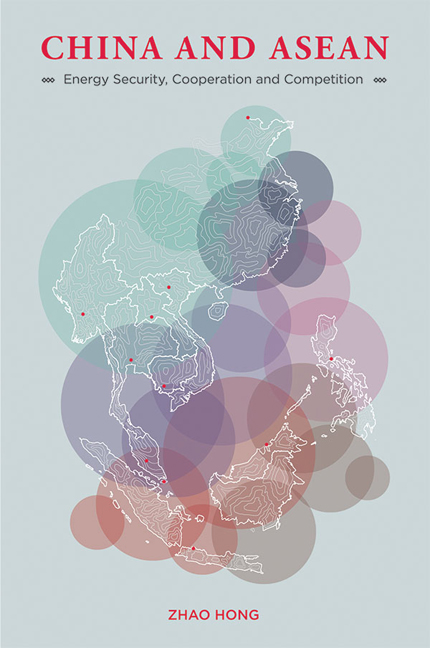Book contents
- Frontmatter
- Contents
- List of Tables and Figures
- List of Abbreviations
- Acknowledgements
- 1 Introduction: China, ASEAN, and the New Global Energy Order
- 2 Economic Growth and Energy Security
- 3 China's Energy Quest in Southeast Asia
- 4 Case Study (1): Myanmar
- 5 Case Study (2): Indonesia
- 6 Energy Resource Competition and the South China Sea Disputes
- 7 Conclusion
- Index
- About the Author
- Frontmatter
- Contents
- List of Tables and Figures
- List of Abbreviations
- Acknowledgements
- 1 Introduction: China, ASEAN, and the New Global Energy Order
- 2 Economic Growth and Energy Security
- 3 China's Energy Quest in Southeast Asia
- 4 Case Study (1): Myanmar
- 5 Case Study (2): Indonesia
- 6 Energy Resource Competition and the South China Sea Disputes
- 7 Conclusion
- Index
- About the Author
Summary
Although Myanmar is a natural resource-rich country, from a global perspective, it does not have particularly notable hydrocarbon reserves. For China, however, from a regional perspective, Myanmar's gas reserves and strategic position are significant in terms of energy security and regional cooperation. However, although China has planned to stake a longterm strategic energy investment in Myanmar and its capital has largely poured into resources and energy-related infrastructural sectors, some factors are pushing the two countries’ energy ties toward competition and conflicts. Chinese foreign direct investment (FDI) in Myanmar no doubt ties the two countries closer together, but also reminds politicians of “new colonialism”, creating concerns and resource nationalism in the local society. Moreover, as Myanmar opens up, the entry or resurgence of more global players like Japan and India provides Myanmar with more options, facilitating its attempts at loosing itself from the Chinese grip. Hence, the questions that require examination are as follows: What direction is the China–Myanmar energy tie going in, cooperation or conflict? How will China adjust its approaches and better embrace the new environment and dynamic changes in the country?
GLOBAL ENERGY RESOURCE NATIONALISM
Over the past two decades, there has been a growing recognition that natural resources play an important and complex role in international and regional peace and security. Natural resources can be a source of cooperation and stability, it can as well be a source of hostility or grievances, which may be related to the loss of sovereignty, the inequitable distribution of benefits from natural resources, the lack of opportunities for local people, or environmental and social harm caused by unsustainable extraction of resources. While such hostility or grievances may not be the sole causes of conflicts, they may lead to the rise of resource nationalism which has real potential to spark armed conflicts especially in disputed areas.
The term “resource nationalism” is often defined as a national government's assertion of ownership rights over oil and natural resource reserves within their territorial boundaries, usually in ways that contradict liberal paradigms for encouraging foreign investment, and work against the international energy companies.
- Type
- Chapter
- Information
- China and ASEANEnergy Security, Cooperation and Competition, pp. 112 - 141Publisher: ISEAS–Yusof Ishak InstitutePrint publication year: 2015



